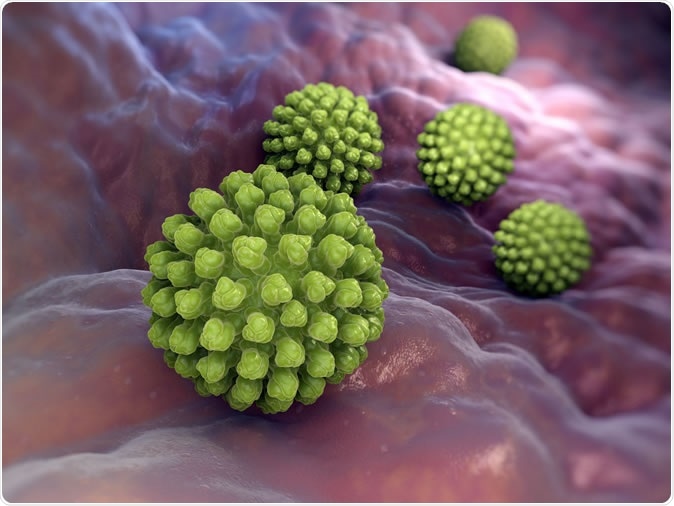A new article published in the journal PLOS Pathogens on October 10, 2019, claims that the common rotavirus may be responsible for some occurrences of type 1 diabetes, a form of diabetes which occurs in children and is due to destruction of the pancreatic islet cells that produce the hormone insulin to normalize blood glucose levels.

Rotavirus infection may play a role in the development of type 1 diabetes, according to a front matter article published October 10 in the open-access journal PLOS Pathogens by Leonard C. Harrison of the University of Melbourne in Australia, and colleagues. Image Credit: Tatiana Shepeleva / Shutterstock
Rotavirus – what is it?
Rotavirus is the biggest cause of gastroenteritis in infants all over the world. However, rotavirus vaccination has now brought down the rate of infant deaths due to this condition significantly. Another striking finding is the 15% reduction in type 1 diabetes in children below 4 years of age, in Australia, after rotavirus vaccination was introduced there. This suggests a link between these entities, which is also in agreement with human and animal studies that show rotavirus may be the missing piece in the puzzle as to what triggers type 1 diabetes in children with the wrong type of genes.
Rotavirus – autoantibodies against islet cells
Type 1 diabetes is caused by autoimmune disease but needs to be triggered by an environmental stimulus that causes autoantibodies to form against the islet cells. In about half the cases the children affected by this condition have an HLA IA-2 antigen and a GAD65 antigenic site (encoded by one of the HLA genes on chromosome 6p21) that are both very similar to certain amino acid sequences in a rotavirus protein called VP7, a protein which is responsible for stimulating the human immune system to produce antibodies against the virus. Both VP7and the HLA IA-2 are bound to the HLA DR4 related receptor, that is known to be associated with a higher risk for type 1 diabetes, and are both recognized by the same T cell receptor. This is a classic case of functional molecular mimicry. In this phenomenon, the invading particle and the host share a very similar protein or protein sequence such that the host antibody response can equally well act against the host as well, producing autoimmunity.
The current review shows that autoantibodies to the islet cells occur in the serum of children with a history of rotavirus infection. In these children, rotavirus infection was followed by autoantibody appearance or increase in 86%, 62% and 50% of cases, respectively.
Rotavirus – direct pancreatic damage?
There is evidence of pancreatic damage following such infection. Mice infected with monkey rotavirus showed evidence of widespread cell death in the islets, followed by rapid regeneration with residual damage. Human studies have also shown a decrease in pancreatic size in patients with type 1 diabetes, and much later this was shown to occur also in relatives of these patients who are at risk for the condition. However, the animal study showing pancreatic damage due to rotavirus infection used viruses from monkeys to infect pancreatic tissue in mice, which may not translate into similar phenomena in human beings. More studies using homologous species systems will be required to validate these findings.
The time of exposure may play a role in whether the infection promotes or reduces the risk of diabetes. An interesting sidelight on this issue is obtained from the Australian results, where rooming-in of infants with their mothers throughout the hospital stay was introduced in the 1970s, which may have delayed the exposure of the newborns to rotavirus until later in life (a few months after birth). At this point it might actually protect against diabetes. This agrees with mouse experiments where neonatal exposure to rotavirus promoted diabetes but post-weaning infection protected against it.
Rotavirus – environmental trigger?
Moreover, they show that changes in the environment also contribute to the rise of type 1 diabetes, and one such factor may probably be rotavirus infection. The number of cases of type 1 diabetes in children worldwide began to increase after the 1950s, but most of these new cases in Australia were due to the development of the condition in children with HLA genes considered to be ‘low-risk’. The number of cases occurring in children with the ‘highest-risk” HLA DR4-related genes remained the same. Thus an environmental factor was suspected to be responsible for the increase in previously less susceptible children. Epidemiological data also shows a correlation between a falling incidence of type 1 diabetes and rotavirus vaccination. Several studies have shown a 33% reduction in risk among vaccinated children, and a greater effect with the use of the pentavalent vaccine than the monovalent type (37% vs 27%).
Future implications
Measures for the future include studies to identify the children who will be benefited the most by rotavirus vaccination, and research on the mechanisms by which this virus promotes the development of type 1 diabetes – is it due to direct infection of the pancreas which causes the production of autoantibodies against the islet cells, resulting in diabetes?
In any case, rotavirus vaccination appears to have a significant advantage in ‘immunizing’ children against type 1 diabetes mellitus as well.
Journal reference:
Does rotavirus turn on type 1 diabetes? Harrison LC, Perrett KP, Jachno K, Nolan TM, Honeyman MC PLoS Pathogens 15(10): e1007965. October 10, 2019. https://doi.org/10.1371/journal.ppat.1007965. https://journals.plos.org/plospathogens/article?id=10.1371/journal.ppat.1007965